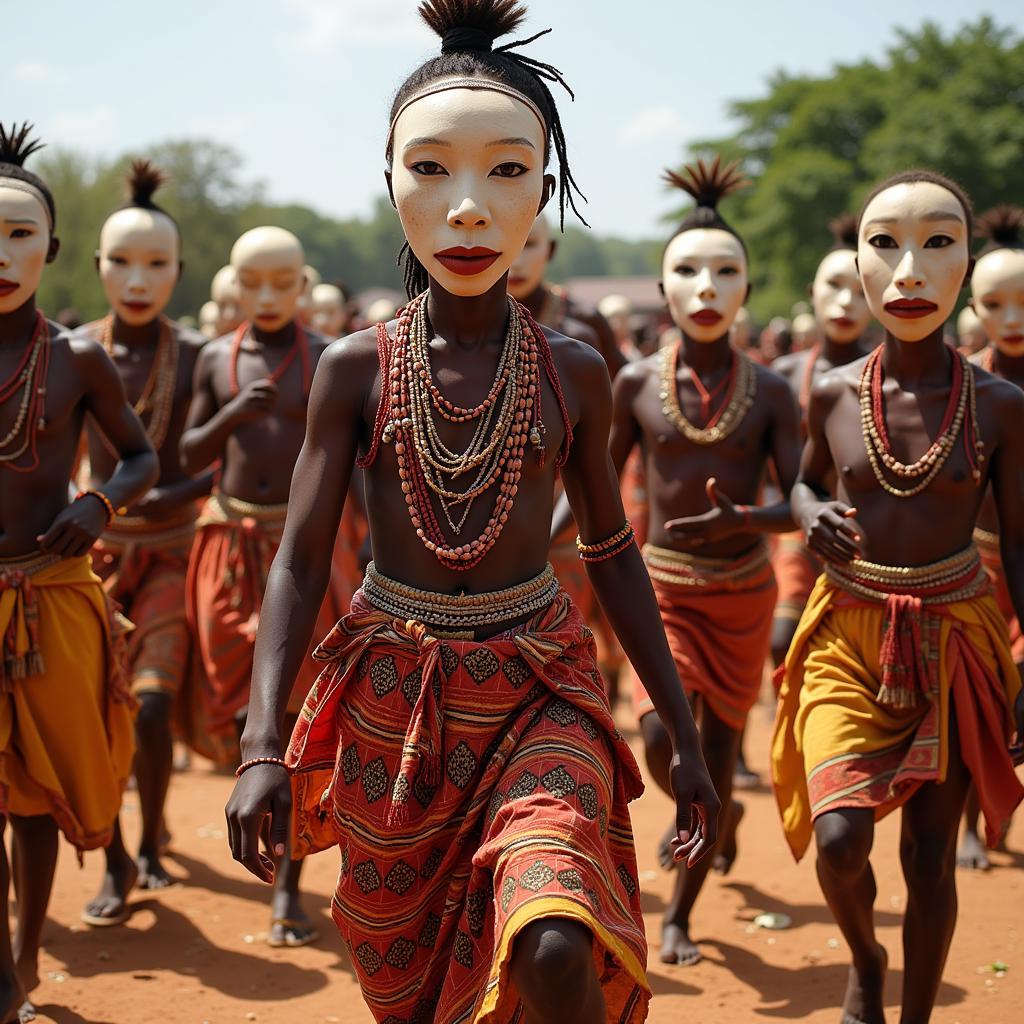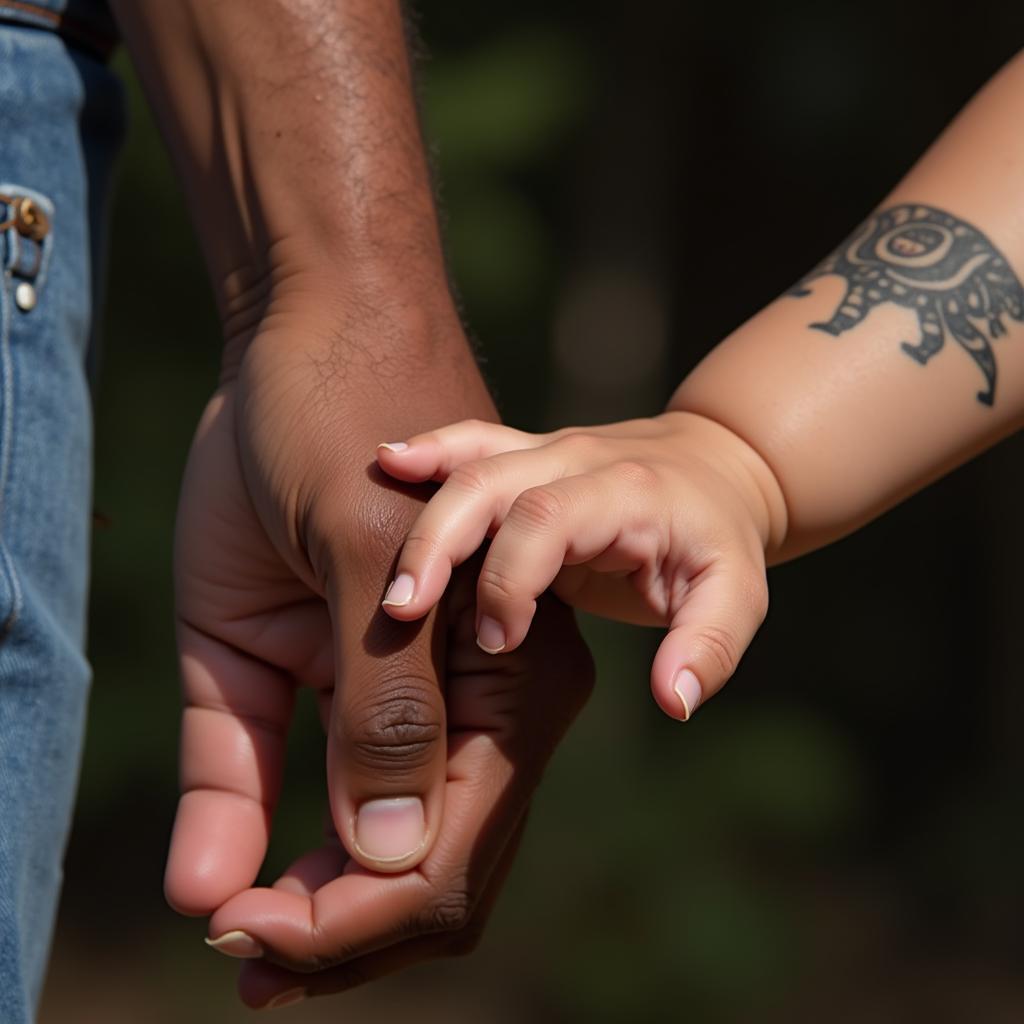Exploring the World of Simple African Masks
Simple African Masks, often seen as powerful symbols of African culture, offer a captivating glimpse into the continent’s rich artistic traditions. These masks, though seemingly simple in design, hold deep meaning and play integral roles in various ceremonies and rituals. From representing spirits and ancestors to embodying social and moral values, simple African masks are much more than decorative objects. They are a testament to the ingenuity and creativity of African artists and a window into the complex tapestry of African life. Check out this easy African art.
Unmasking the Significance of Simple Designs
The beauty of simple African masks often lies in their minimalist approach. Clean lines, geometric shapes, and a focus on essential features allow the masks to convey powerful messages without unnecessary embellishment. This simplicity doesn’t equate to a lack of sophistication. Rather, it highlights the skill of the artist in capturing the essence of the subject, be it an animal spirit, a revered ancestor, or an abstract concept.
These masks are frequently used in ceremonial dances, theatrical performances, and rituals marking important life events such as births, initiations, marriages, and funerals. Their presence adds a layer of mystique and reverence to these occasions, connecting the community to the spiritual realm and their ancestral heritage.
Materials and Techniques in Simple Mask Making
Simple African masks are crafted from a variety of readily available materials, reflecting the close relationship between African art and the natural environment. Wood is the most common medium, with different types chosen for their specific properties, such as durability, texture, and color. Other materials include various types of gourds, woven fibers, animal hides, and even recycled metal.
The creation of a simple African mask is often a meticulous process passed down through generations. Traditional tools are used, from adzes for shaping the wood to knives for carving intricate details. The surface of the mask may be treated with natural pigments, dyes, or other materials to achieve the desired color and finish.
The Role of Simple Masks in African Society
Beyond their aesthetic appeal, simple African masks serve vital social and cultural functions. They are often used to:
- Represent spirits and deities: Masks can embody powerful spirits, acting as intermediaries between the human and spiritual worlds.
- Honor ancestors: Masks can depict deceased relatives, allowing their presence to be felt during important ceremonies.
- Enforce social order: Masks can represent figures of authority, used in rituals to uphold community laws and values.
- Educate and entertain: Masks can be used in storytelling and theatrical performances, transmitting cultural knowledge and values.
 African Mask Ceremony with Dancers
African Mask Ceremony with Dancers
“Simple African masks aren’t just objects,” says Dr. Aboubakar Fofana, a renowned anthropologist specializing in West African cultures. “They are living embodiments of cultural beliefs and traditions, connecting communities to their past and present.”
What Are Some Common Designs in Simple African Masks?
Common designs in simple African masks often feature human faces, animal figures, or a combination of both. Human face masks can represent ancestors, deities, or idealized human qualities. Animal masks often depict powerful creatures like lions, elephants, or birds, symbolizing their strength, wisdom, or spiritual significance. Abstract designs can also be found, representing concepts such as fertility, prosperity, or balance.
How Can I Identify Authentic Simple African Masks?
Identifying authentic simple African masks requires careful observation and research. Look for signs of age and wear, such as patina on the surface or minor imperfections. Consider the materials used and the craftsmanship. Authentic masks are typically made from natural materials and exhibit skilled carving techniques. Researching the specific style and origin of the mask can also help determine its authenticity.
“Authenticity lies in the details,” advises Adeola Olayinka, a curator of African art. “Examining the materials, craftsmanship, and cultural context is crucial in distinguishing genuine pieces from imitations.”
Conclusion
Simple African masks, with their understated elegance and powerful symbolism, provide a fascinating entry point into the diverse cultures of the African continent. By understanding their significance and appreciating the artistry behind their creation, we can gain a deeper appreciation for the rich tapestry of African Life. These masks are more than just artifacts; they are living expressions of culture, tradition, and belief, connecting us to the vibrant heart of Africa. Explore further with African bathroom decor or even African clay modelling art. Let’s explore more on african continent wallpaper hd. It is really amazing how African men dress within the jungle. Find out more on african jungle men wearing.
FAQ
- What are simple African masks typically made of? Wood, gourds, fibers, hides, and sometimes metal.
- What is the significance of simple African masks? They represent spirits, ancestors, and social values.
- How are simple African masks used? In ceremonies, rituals, performances, and storytelling.
- What are some common designs found on simple African masks? Human faces, animal figures, and abstract patterns.
- How can I tell if a simple African mask is authentic? Look for age, wear, materials, craftsmanship, and research the style and origin.
- Are simple African masks just decorative objects? No, they hold deep cultural and spiritual meaning.
- Where can I learn more about simple African masks? Museums, cultural centers, and online resources.
Common Scenarios
- A tourist looking for authentic simple African masks to purchase.
- A student researching the cultural significance of simple African masks.
- An artist seeking inspiration from simple African mask designs.
- A museum curator looking to expand their collection of African art.
Further Exploration
- Read more about specific types of African masks from different regions.
- Explore the history and evolution of African mask making.
- Learn about the role of masks in various African ceremonies and rituals.
Need help? Contact us 24/7:
Phone: +255768904061
Email: [email protected]
Address: Mbarali DC Mawindi, Kangaga, Tanzania.
